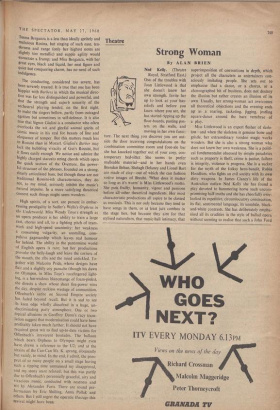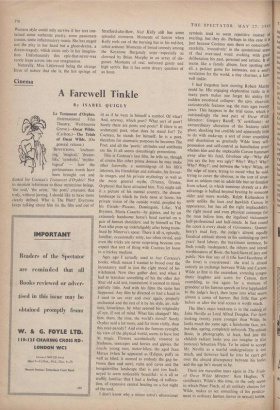Theatre
Strong Woman
By ALA N BRIEN Ned Kelly. (Theatre Royal, Stratford East.) ONE of the troubles with Joan Littlewood is that she doesn't know her own strength. Invite her up to look at your bas- reliefs and before you know where you are, she has started ripping up the floor-boards, pasting pos- ters on the walls, and moving in her own furni- ture. The next thing you discover you are out- side the door receiving congratulations on the combination committee room and four-ale bar she has knocked together out of your cosy, con- temporary bed-sitter. She seems to prefer malleable material—and in her hands even Brendan Behan, Shelagh Delaney and Lionel Bart are made of clay—out of which she can fashion votive images of Brecht. 'What does it matter so long as it's warm' is Miss Littlewood's motto. She puts frailty, humanity, vigour and passions before all -other theatrical ingredients. Her most characteristic productions all aspire to be classed as musicals. This is not only because they tend to have songs in them, or at least jazz combos in the stage box, but because they aim for that stylised naturalism, that music-hall intimacy, that superimposition of conventions in depth, which project all the characters as entertainers con- sciously imitating people. She sets out to emphasise that a dance, or a chorus, or a choreographed bit of business, does not destroy the illusion but rather creates an illusion of its own. Usually, her strong-woman act overcomes all theoretical objections and the evening ends up as a roaring, racketing, jigging, jostling square-dance around the bare vertebrae of a play.
Miss Littlewood is an expert flesher of skele- ton—and when the skeleton is genuine bone and gristle, her extraordinary voodoo magic works wonders. But she is also a strong woman who does not know her own weakness. She is a politi- cal fundamentalist obsessed by simple paradoxes such as property is theft, crime is justice, failure is integrity, violence is progress. She is a sucker for the myth of the folksy hero-bandit, Robin Hoodlum, who fights an evil society with its own dirty weapons. In James Clancy's life of the Australian outlaw Ned Kelly she has found a play devoted to hammering home such uncom- promising half-truths and she has cheerfully over- looked its repetitive, circumlocutory construction, its flat, sentimental language, its unsubtle, black- and-white contrasts. She has deliberately empha- sised all its crudities in the style of ballad opera without seeming to realise that such a John Ford Western style could only survive if her text con- tained some authentic poetry, some passionate ironies, some inflammatory music. She has staged not the play in her hand but a ghost-drama, a dream-tragedy, which exists only in her imagina- tion. Unfortunately this epic-that-never-was rarely leaps across into our imagination.
Naturally, Miss Littlewood being the strange force of nature that she is, the hot springs of Stratford-atte-Bow, Ned Kelly still has some splendid moments. Moments of horror when Kelly reels out of the burning but in his red-hot, robot armour. Moments of broad comedy among the Keystone Burgundy cops—especially as downed by Brian Murphy in an array of dis- guises. Moments of real, unforced gaiety and high spirits. But it has some dreary quarters of an hour.







































 Previous page
Previous page